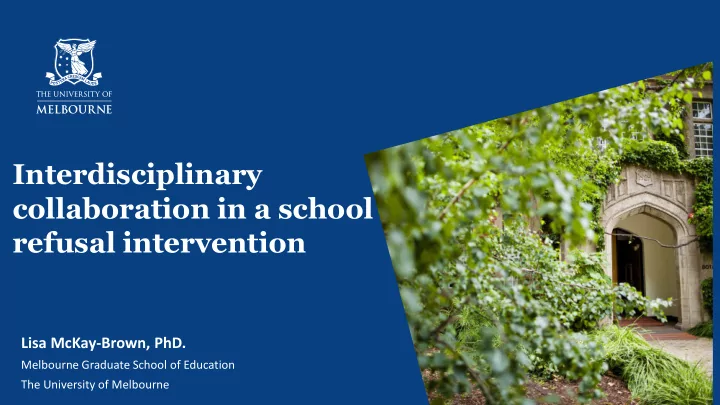

Interdisciplinary collaboration in a school refusal intervention Lisa McKay-Brown, PhD. Melbourne Graduate School of Education 1 The University of Melbourne
Benefits of interdisciplinary teams • Opportunity to target complex needs when delivering interventions for youth • Improve social and academic outcomes for young people • Interdisciplinary partnerships lead to improvements in child mental health, improvements in home-school relationships, an increased understanding of mental health by teachers, and an increased understanding of the school context for clinicians (Eber, Breen, Rose, Unizycki, & London, 2008; Pettitt, 2003; Weist, Axelrod Lowie, Flaherty, & Pruitt, 2001) 2
Types of collaborations Multidisciplinary : hierarchical, may exclude the family/student, are led by one person, members have limited knowledge about others’ disciplines and are accountable to themselves Interdisciplinary : less hierarchical, more inclusive of the family/student, less dependent on a central leader, members understand others’ disciplines but operate within boundaries, and members accountable to self and others Interprofessional collaborative practice : family/student focused, use shared leadership, clarify roles, share knowledge across disciplines, members share responsibility and accountability and there is continuous communication (Golom & Schreck, 2018). 3
Phase 1 Phase 3 Phase 2 Return to Therapeutic & Relationship mainstream educational programs building and school delivered in assessment transitional classroom
Governance Melbourne Graduate Royal Children’s Travancore DHHS DET School of Education Hospital School Director: Principal School Principal Mental Health Researcher Operations Manager Steering • Alignment of vision and strategic Committee directions • Meeting strategic goals for all partners • Shared purpose In2School Team • Commitment - MOU Teachers 1.6 Clinician 1.0 Speech Pathologist 0.2 5
Models of disability Images by Gerd Altmann from Pixabay 6
Intervention Therapy Education Combined • Individual therapeutic • Full time classroom • Evening parent group sessions with young attendance series • School liaison • Social communication person • Specialist assessments • Curriculum development classroom program • Individual parent work • Family phone support and delivery • Medication/ psychiatrist • Positive behaviour • Home visits (if required) • Psychoeducation sessions review classroom interventions • Care coordination • Implement/review ILPs for partner schools • Family therapeutic • Community based • Return to school plans • Travel training support excursions • Family communication and • New school transfer and liaison enrolment (if required)
8
Roles and Communication Enablers Barriers • Memorandum of Understanding • No existing multi agency process • Research/Program Protocols to support records management, • History of agency collaboration sharing of evaluation data • Small team reduces • Sharing of some roles requires miscommunications specific skills and confidence • Regular cross-agency often outside existing professional skillsets communication at management level • Different staff selection practices • Built in links and supports with discipline and practice leadership 9
Resourcing Enablers in place ….. Barriers to address ……. • • Co-location Financial uncertainty – commitment at education and health department • Some agreement around sharing level resources: physical space, vehicles, • crisis support Inadequate resourcing • • Admin support Agreements around funding between agencies • Appropriately skilled staff • Specialist family therapy • Capacity for short term staff cover • Enhanced follow-up • Professional Learning • Time to develop and sustain working • Discipline specific oversight 10 relationships
This program works, the collaboration between health and education optimises recovery , not just From the staff with school refusal difficulties but with their learning, social interactions and emotional regulation and their family relationships. Families This (integrated) model helps schools and feel supported , schools feel supported and the families feel safer – there is a greater sharing of young person feels supported . It is essential for the load of what they are going through …..the sustainable recovery . (Clinician) message we provide has more strength when it is delivered together . I had more confidence in challenging schools and families knowing that I was backed up by other professionals (Teacher) Having trust in each other’s expertise and valuing the roles and contributions we each have has been crucial to each of us performing our best in our respective roles. (Teacher) Working in this model allowed me to see things through a different lens , have a broader perspective in understanding student’s needs. (Teacher) 11
Questions? lisamb@unimelb.edu.au @lisa_mckaybrown 12
Recommend
More recommend